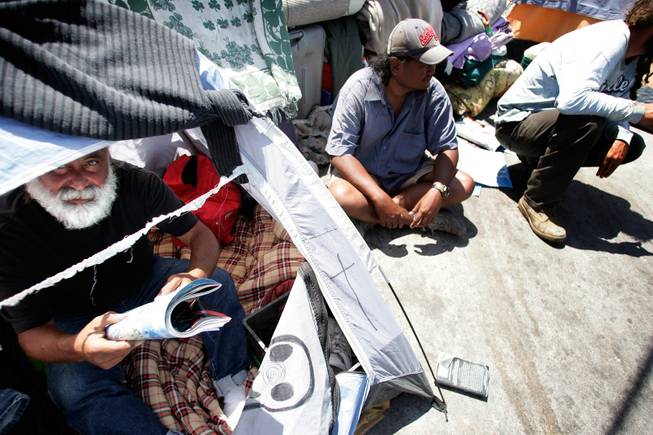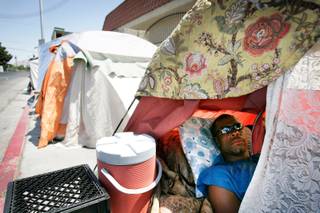
Leo Afshar, from left, Johnny Van, center, and Bill Levenson hang out in the homeless encampment on Foremaster Lane between Las Vegas Boulevard North and Main Street in Las Vegas on Friday, May 15, 2009.
Sunday, May 17, 2009 | 2 a.m.
Sun Archives
- Street sweeps won't solve street sleep (4-17-2009)
- Metro rethinks 'Don't feed homeless' (4-14-2009)
- Growing homeless settlement vexes business, Goodman (4-3-2009)
Foremaster Lane and Main Street
Las Vegas seeks to use $2.1 million in federal stimulus money to get dozens of homeless people off a downtown street and into housing, an idea experts say misses the intention of the grant and could waste an opportunity to help thousands more hit by the economic collapse.
The federal money, part of $1.5 billion being given to 540 public and private agencies nationwide, is for preventing homelessness or helping homeless people quickly into housing. But private and public officials tied to the funding said the hope is that communities across the nation use the grants to help set in place sweeping changes in the way they help the homeless, while focusing as much as possible on people beaten back by the current crisis.
The city’s proposal, due at the federal Housing and Urban Development Department on Monday, focuses on a tent city at Foremaster Lane and Main Street that has caused controversy in recent months as Mayor Oscar Goodman has called for cleaning up the area.
The city’s plan proposes spending about 10 percent on the first goal, leaving most of the rest to the effort to clean up Foremaster. The problem, experts say, is that most of the population in such tent cities is chronically homeless, or those who have lived longest on the streets and often struggle with mental illness and addiction. The chronically homeless, they say, usually require years of intensive case management after getting into housing. The federal grants require people to be in stable housing in 18 months or less.
“If you have someone with mental illness, addiction, a lot of needs ... this is not the program these people might need,” said Mark Johnston, a deputy assistant secretary at HUD who has been offering training on the federal money across the country. “Generally speaking, this is not going to be a program for the chronically homeless.”
Nan Roman, president of the National Alliance to End Homelessness, a Washington-based group, said a plan such as Las Vegas’ could result in a tent city reappearing in 18 months or so. Her group advised Congress on the funding. She said the federal government couldn’t require the grant to help only people affected by the current economy, but noted that joblessness in particular could drive 1.5 million people to homelessness nationwide during the next two years. The HUD program is in a unique position to stem that increase, she said.
Linda Lera-Randle El, director of Straight from the Streets, has seen tent cities on Las Vegas streets for 25 years and moved hundreds into housing. She said public and private agencies “need to look at funding that fits each population — and I’m not so sure this is the best use of the stimulus funds.” She estimated that 90 percent of the people living on Foremaster are chronically homeless and echoed Roman’s concerns, both in terms of whether the city’s plan would work and whether it would be the best use of the money.
Lera-Randle El also sees more people being pushed closer to the streets by the economy. At least two-thirds of the federal money should be aimed at preventing homelessness through simple tools such as help with rent and utilities, she said.
“We need to set infrastructure in place to deal with people affected by the economy, heading for disaster,” she said. “That would be using this money to close the front door of homelessness, so people don’t hit the back door.”
Lera-Randle El, who has sat in on dozens of meetings on homelessness over the years, also noted that Las Vegas prepared its plan solo, despite years of coordinated, regional planning on the issue.
Shannon West, whose salary as regional homeless service coordinator is paid by all area municipalities, said she did not work on Las Vegas’ plan.
And Clark County, North Las Vegas and Henderson are submitting a joint proposal to spend $4.1 million in stimulus money that focuses more on prevention and on broader issues such as tightening communication between agencies that help the homeless.
Roman said the money should be used to set in place changes that would last. “It offers a tremendous ... transformation potential,” she said, adding that focusing on prevention and coordinating services better would help long after the recession is over.
Tim Whitright, development manager at the Las Vegas Neighborhood Services Department, did not directly address concerns surrounding the city’s proposal, but defended focusing on Foremaster.
“We were already looking at addressing the issue in the area, and this money seemed like a perfect segue,” he said.
“We think it fits within the guidelines.”


Join the Discussion:
Check this out for a full explanation of our conversion to the LiveFyre commenting system and instructions on how to sign up for an account.
Full comments policy